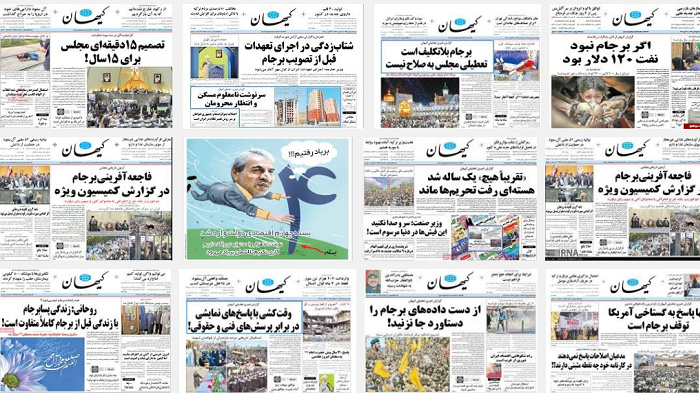Told You So: Conservative daily Kayhan says extension of Iran sanctions was predictable

(Picture: Front page of Kayhan Daily editions criticizing nuclear negotiations and agreement.)
Kayhan Daily’s editor-in-chief Hossein Shariatmadari, one of the most vocal critics of the nuclear deal, has once again slammed the Rouhani administration’s team of nuclear negotiators in what seems to be a response to the recent extension of Iran Sanctions Act, ratified with unanimous vote in the US Senate. Shariatmadari began his Saturday editorial by ironically saying he did not want to question or scorn the Iranian negotiators whose ignorance of firmly grounded warnings by concerned critics has brought the nuclear agreement to a point where losses should be counted rather than achievements. Calling for a review of the past three years to learn lessons and stymie a recurrence, Kayhan’s editor-in-chief openly called for “a new captain aboard” the country’s nuclear ferry amid the ‘stormy waves of deceit’.
Recapping an April 04, 2015 article in Kayhan daily that criticized the Lausanne Framework, Shariatmadari reminded his readers that Kayhan had foretold the prospect for the ‘suspended’ (and not terminated) sanctions to be re-imposed, and that Iran’s missiles capabilities would be the next in line because the nuclear dossier was only a cover story. Claiming that everything Kayhan predicted is now fully realized, he asserted that there has been an unbridgeable gap between exaggerated praise for the deal and the bitter reality behind the Lausanne Framework and the harmful text of the Joint Comprehensive Plan of Action (JCPOA). “Thus, the exaggerations and hyperbolic remarks made by our friends on the nuclear deal can best be viewed as grounded in their simple-mindedness or unjustifiable trust in an enemy who has openly stressed its animosity to Iran, spared no effort to plot against the country and proved so many times that it upholds none of its commitments,” he wrote.
Implicitly referring to the President Rouhani’s remarks in presenting the deal as ‘the miracle of the century’ or ‘a great conquest’, Shariatmadari concluded that the Rouhani administration had taken the wrong path in resolving the nuclear dossier. “The path trodden requires a fundamental reconsideration and of course the question is whether the incumbent officials have the ability to set foot on the new path or not,” he added.
Shariatmadari moved on by putting part of the blame on parliamentary leaders who passed the nuclear agreement in a notorious 20-minute session, “closing their eyes to the documented report submitted by the Special Committee on the JCPOA”. He called on the group behind the legislation to be responsible to the nation, together with the officials involved in the talks.
Kayhan’s editor-in-chief then drew on the extension of Iran Sanctions Act, calling it an explicit violation of the nuclear deal, as it targets trade, energy, military and banking activities related to Iran’s nuclear and missiles program. He pointed to the provision V and Articles 21, 24 and 26 in support of his argument but fails to take into account the only mention of ISA in the JCPOA, where United States is only obliged to remove certain individuals and entities from the Non-SDN Iran Sanctions Act:
This JCPOA will produce the comprehensive lifting of all UN Security Council sanctions as well as multilateral and national sanctions related to Iran’s nuclear program, including steps on access in areas of trade, technology, finance and energy.
Hossein Shariatmadari further argued that the unanimous votes in the US House of Representatives and the Senate mean that both Democrats and Republicans perfectly agree in hostility towards Iran and those Iranian officials who insist on a distinction between the two should accept they have been beating the wind. Without directly naming anyone, Shariatmadari called “ridiculous” comment by former nuclear negotiator Hossein Mousavian who, early after the Lausanne Agreement, dubbed the nuclear deal as a political earthquake in the United States, unprecedented in the recent century, due to the rift it created between pro- and anti-deal factions in this country.
Shariatmadari bulldozed the Reformists too. Rapping a “not-so-healthy political faction” who argues that Obama’s right to waive the bill means that the deal is not violated, he said the waiver could only postpone the operation of ISA for 3 to 6 months. This unhealthy faction “is still surprisingly trying to deceive the nation and make up the obnoxious and oath-breaker face of the US,” he added.
He concluded his editorial by saying that the main achievement of the talks has been further proof of the fact that the US is untrustworthy. “The main remedy lies in a return to our exemplary capabilities,” he recommended.

